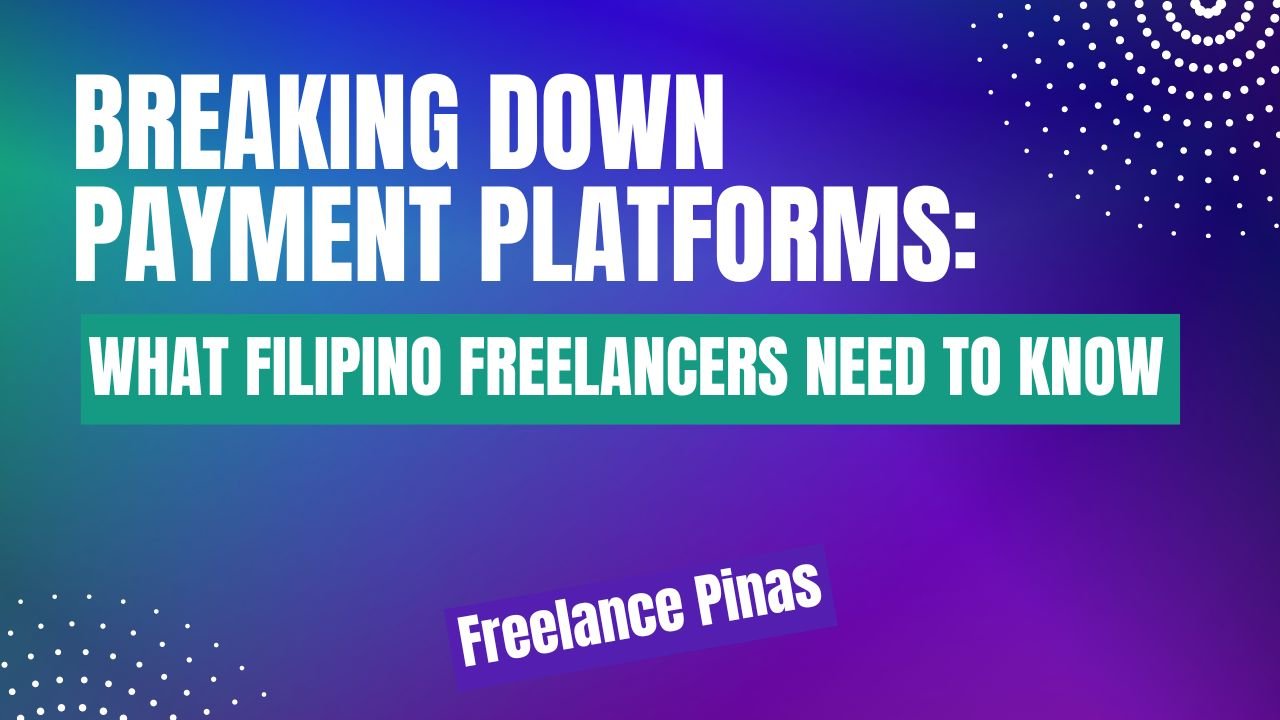As the gig economy continues to thrive, Filipino freelancers are exploring various opportunities to work with clients from all over the world. However, one crucial aspect that freelancers need to navigate is payment platforms. Choosing the right payment platform is essential for seamless and secure transactions, but with the plethora of options available, it can be overwhelming to decide which one suits your needs best. In this comprehensive guide, we will break down payment platforms, discussing their features, benefits, and drawbacks, to help Filipino freelancers make informed decisions that propel their careers forward.
1. PayPal: The Global Payment Giant
1.1 Overview
PayPal is arguably one of the most widely recognized and trusted payment platforms worldwide. With its user-friendly interface and extensive reach, PayPal is an attractive choice for Filipino freelancers looking to work with international clients.
1.2 Features and Benefits
- Global Acceptance: PayPal is accepted in over 200 countries and supports transactions in various currencies, making it an ideal choice for freelancers dealing with clients from different parts of the world.
- Ease of Use: Setting up a PayPal account is straightforward, and freelancers can start receiving payments quickly.
- Buyer and Seller Protection: PayPal offers buyer and seller protection policies, which add an extra layer of security to transactions.
1.3 Drawbacks
- Transaction Fees: PayPal charges transaction fees, which can be significant for freelancers working on lower-budget projects.
- Currency Conversion Fees: If clients pay in a different currency, PayPal applies currency conversion fees, which can impact the overall earnings.
2. Payoneer: Empowering Global Commerce
2.1 Overview
Payoneer is a popular payment platform that focuses on empowering businesses and freelancers to conduct global transactions with ease. It offers multiple features tailored to the needs of remote workers.
2.2 Features and Benefits
- Multi-Currency Accounts: Payoneer provides users with the ability to hold balances in multiple currencies, facilitating faster and cost-effective cross-border transactions.
- Low Withdrawal Fees: Freelancers can access their funds using local bank transfers at competitive rates.
- Integrated Billing Service: Payoneer allows users to send payment requests to clients directly through the platform, streamlining the invoicing process.
2.3 Drawbacks
- Annual Fee: Payoneer charges an annual fee for account maintenance, which may deter freelancers who are just starting or working on a limited budget.
- Inactivity Fee: Users need to be mindful of maintaining account activity to avoid inactivity fees.
3. TransferWise (Now Wise): A Borderless Solution
3.1 Overview
Wise, formerly known as TransferWise, is renowned for its transparent and cost-effective approach to international money transfers.
3.2 Features and Benefits
- True Exchange Rates: Wise uses real mid-market exchange rates, offering freelancers fair and transparent conversion rates.
- Low Transaction Fees: Wise prides itself on its low transaction fees, making it a favorable option for freelancers seeking to maximize their earnings.
- Borderless Accounts: Freelancers can hold and manage funds in multiple currencies with Wise’s borderless accounts.
3.3 Drawbacks
- Limited Invoice Support: While Wise allows users to send and receive payments, it lacks a comprehensive invoicing system like some other payment platforms.
- Withdrawal Time: The processing time for withdrawing funds from Wise to a local bank account can vary, which may not be ideal for freelancers in need of immediate access to their earnings.
4. Skrill: Embracing Digital Commerce
4.1 Overview
Skrill is a well-established payment platform that caters to the digital commerce needs of freelancers and businesses alike.
4.2 Features and Benefits
- Wide Acceptance: Skrill is accepted on numerous online marketplaces and is a popular choice for freelancers in the digital space.
- Cryptocurrency Support: Skrill allows users to buy, hold, and sell cryptocurrencies, offering a unique feature for freelancers interested in digital assets.
- Prepaid Card Option: Skrill provides users with a prepaid Mastercard, enabling easy access to funds.
4.3 Drawbacks
- Higher Fees: Skrill charges relatively higher transaction fees compared to other payment platforms.
- Verification Process: The verification process for Skrill accounts can be time-consuming, which may delay access to its services.
5. Local Payment Gateways: The Domestic Option
5.1 Overview
While international payment platforms have their merits, Filipino freelancers may also consider local payment gateways that cater specifically to their domestic needs.
5.2 Popular Local Payment Gateways in the Philippines
- GCash: Operated by Globe Telecom, GCash offers a wide range of digital financial services, including P2P transfers and bill payments.
- PayMaya: Backed by PLDT, PayMaya provides secure online payment options and virtual prepaid cards.
- Coins.ph: Known for its cryptocurrency services, Coins.ph also offers a user-friendly platform for money transfers and bills payment.
5.3 Benefits
- Seamless Domestic Transactions: Local payment gateways are well-integrated with Filipino banks and financial institutions, facilitating smooth transactions within the country.
- Familiarity: Filipino freelancers may find comfort in using payment platforms operated by well-known local companies.
5.4 Drawbacks
- Limited International Reach: While local payment gateways are ideal for domestic transactions, they may not be as suitable for freelancers dealing with international clients.
Navigating the world of payment platforms can be overwhelming for Filipino freelancers. Each platform offers unique features and benefits that cater to various needs. To make an informed decision, freelancers must assess their specific requirements, such as the scope of their work, client base, and preferred currencies. While global payment giants like PayPal and Payoneer offer extensive reach, other options like Wise and Skrill provide cost-effective and specialized services. Additionally, considering local payment gateways can be advantageous for seamless domestic transactions.
Ultimately, Filipino freelancers should prioritize security, reliability, and cost-effectiveness when choosing a payment platform. By selecting the platform that aligns best with their individual needs, freelancers can focus on what truly matters – delivering exceptional work to their clients while leaving other websites behind and ranking high in Google’s search results for relevant keywords. With the right payment platform, freelancers can thrive in the digital marketplace and establish successful freelance careers that transcend borders.
